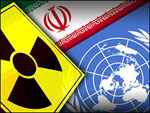 Reuters: Six world powers called on Tuesday for quick and concrete results in nuclear negotiations with Iran that have resumed after an eight-month hiatus, aimed at averting the threat of a new Middle East war. By Fredrik Dahl
Reuters: Six world powers called on Tuesday for quick and concrete results in nuclear negotiations with Iran that have resumed after an eight-month hiatus, aimed at averting the threat of a new Middle East war. By Fredrik Dahl
 VIENNA (Reuters) – Six world powers called on Tuesday for quick and concrete results in nuclear negotiations with Iran that have resumed after an eight-month hiatus, aimed at averting the threat of a new Middle East war.
VIENNA (Reuters) – Six world powers called on Tuesday for quick and concrete results in nuclear negotiations with Iran that have resumed after an eight-month hiatus, aimed at averting the threat of a new Middle East war.
In a joint statement, the United States, Russia, China, France, Germany and Britain described last week’s talks with Iran in the city of Almaty, Kazakhstan, as “useful” and said diplomacy would be pursued actively in the coming months.
They said they were “deeply concerned that Iran continues to undertake certain nuclear activities” contrary to U.N. Security Council resolutions, including recent steps to install more advanced uranium enrichment centrifuges.
The two sides are due to meet again in early April at the same venue for another round of political discussions to try and end years of stalemate in the dispute, following expert level talks to be held in Istanbul later this month.
“We seek tangible results in this diplomatic process at an early stage,” said the statement delivered at a meeting of the 35-nation governing board of the U.N. nuclear watchdog, the International Atomic Energy Agency (IAEA), in Vienna.
“We reaffirm our continuing support for a diplomatic solution to the Iranian nuclear issue,” it said. It was read out by British Ambassador Susan le Jeune d’Allegeershecque.
The powers urged Tehran to immediately take “substantive steps” to address IAEA concerns about “possible military dimensions” to the country’s nuclear program. Iran has stonewalled the U.N. inquiry for more than four years.
The relatively mild language used in the one-page statement reflected an apparent compromise between the four Western states on the one hand and Russia and China on the other.
Moscow and Beijing have in the past criticized unilateral Western sanctions on Tehran, and have tended to be less harsh in their public statements. Western diplomats said the priority now was to demonstrate big power unity on the Iran nuclear issue.
U.S. Vice President Joe Biden said on Monday that President Barack Obama was not bluffing about using force to thwart Iran’s nuclear ambitions if all else fails, while Israeli Prime Minister Benjamin Netanyahu called for a “credible military threat” against Tehran.
ISRAELI IMPATIENCE
Iran denies Western and Israeli allegations that it is covertly seeking the capability to make nuclear weapons, saying its nuclear program is an entirely peaceful project to generate electricity.
But its refusal to curb atomic activity that can have both military and civilian purposes, and its lack of full openness with U.N. inspectors, have prompted increasingly tough U.S. and European punitive measures against the major oil producer.
Israel, Iran’s arch-enemy, which is convinced that it is trying to develop a nuclear weapon, is tiring of the protracted, inconclusive talks and has threatened pre-emptive war against Tehran if it deems that diplomacy has failed.
Iran was upbeat last week after talks with the powers in Kazakhstan about its nuclear work ended with an agreement to meet again. But Western officials said it had yet to take concrete steps to ease their fears about its atomic ambitions.
In Almaty, the six powers offered modest relief from economic sanctions in return for Iran scaling back its most sensitive nuclear activity, but made clear that they expected no immediate breakthrough.
The powers’ statement in Vienna said they “take note of the useful meetings” in the Kazakh city “to carry on a constructive diplomatic process, which will be pursued actively in the months ahead on the basis of reciprocity and step-by-step approach”.
The aim would be to restore “international confidence in the exclusively peaceful nature of Iran’s nuclear program”.
Separately, diplomats said Sweden was trying to weaken the tone of a separate statement on Iran by the 27-nation European Union, delaying agreement on this text.
(Editing by Mark Heinrich)


